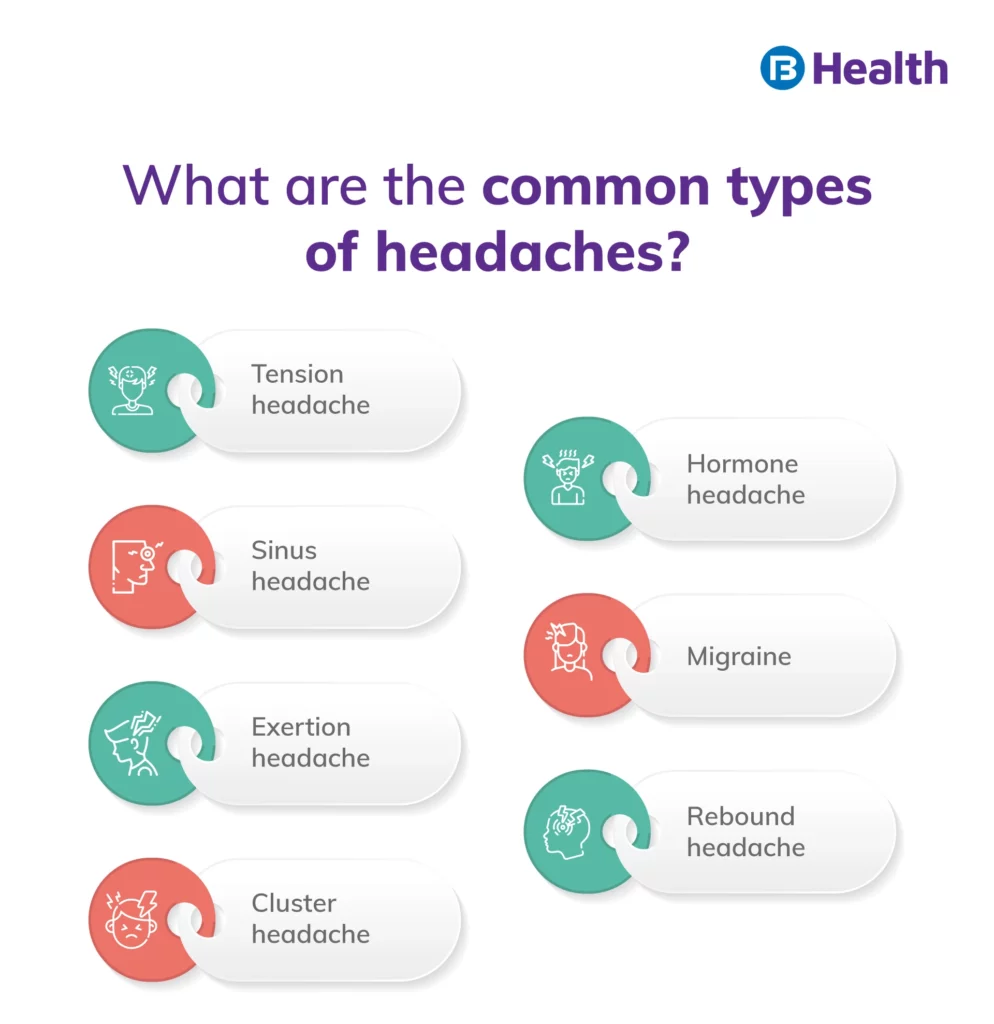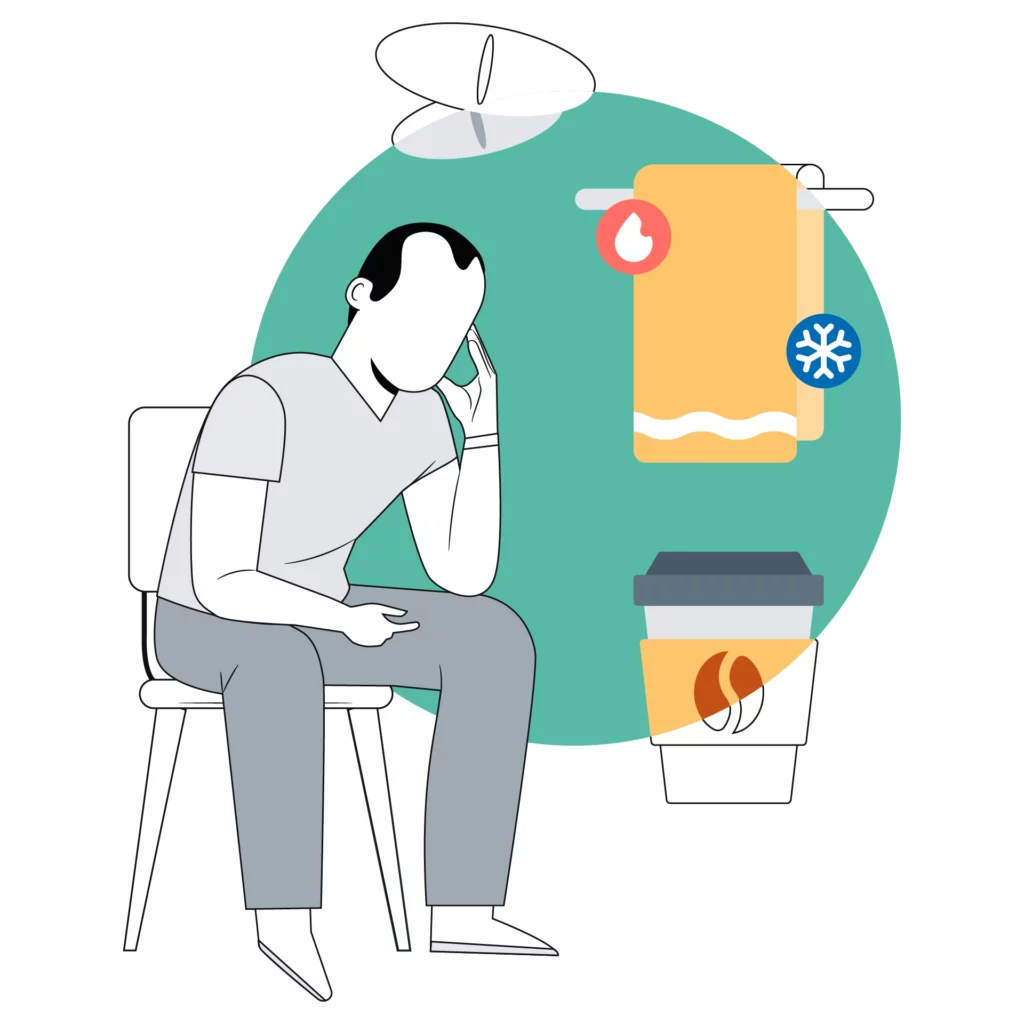General Health | 6 min read
7 Headaches Types and Effective Treatment Options
Medically reviewed by
Table of Content
Synopsis
Headaches could be frustrating and make it difficult to focus on daily tasks. What makes it more problematic is that there are different types of headaches, each with unique characteristics. By understanding these specific characteristics, you can take proactive steps to manage your pain and prevent future occurrences.
Key Takeaways
- Different headaches have different causes, such as stress, dehydration, poor sleep, eye strain, or medical conditions
- Treatment for headaches includes pain relievers, prescription medications, relaxation techniques, lifestyle modification
- If you experience severe or persistent headaches, it's important to get a doctor's consultation to rule out
Headaches are a common type of pain that can occur in various parts of the head, including the forehead, temples, and back of the neck. Depending on the different headache types, they can range from mild to severe and last from a few minutes to several days. While headaches can be caused by various factors, including tension, dehydration, or illness, they can often be managed with the right treatment and lifestyle changes.
Headaches significantly impact our daily lives, making it difficult to focus on work, enjoy activities, and even get a good night's sleep. In this guide, we will explore the seven different types of headaches and causes and the most effective treatment options for different headache types to help you take control.
What Are the Types of Common Headaches?
Before we discuss the specifics of the headache types, it's important to note that various factors, such as lack of sleep, stress, or certain foods, can cause headaches. Understanding your personal headache triggers can help you take preventative measures and reduce the frequency and intensity of your headaches.
The different types of headaches include:
Tension headaches
- Symptoms - A dull, aching pain that feels like a tight band around the head, as well as muscle tension in the neck and shoulders
- Causes – These are the most common types of headache pain and are usually caused by stress, anxiety, poor posture, and muscle strain
- Duration – This one, among the other headache types, can last from some minutes to several days
Migraines
- Symptoms - Intense, throbbing pain on one or both sides of the head, as well as sensitivity to light and sound, nausea, and vomiting
- Causes - Genetics, hormonal changes, stress, and certain foods or environmental triggers
- Duration - A migraine can vary from person to person and from one episode to the next. Typically, a migraine can last anywhere from 4 to 72 hours if left untreated
Cluster headaches
- Symptoms - Severe, stabbing pain behind one eye or on one side of the head, as well as red or teary eyes and a runny or stuffy nose
- Causes- The exact causes of these headache types are unknown but may be related to abnormal brain activity or nerve irritation
- Duration - These are severe headaches that occur in clusters or cycles, typically lasting between 15 minutes to three hours and often occurring at the same time each day

Sinus headaches
- Symptoms – Pain and pressure in the forehead, cheeks, and around the eyes, as well as congestion and sinus drainage
- Causes- Allergies, cold, congestion, sinus infections, or other conditions that cause inflammation in the sinuses
- Duration- Sinus headache is one of the headache types that usually go away on its own within a few days to a week. However, if a bacterial infection causes sinusitis, the headache may persist for several weeks until the infection is properly treated with antibiotics
Rebound headaches
- Symptoms- A persistent headache that occurs daily or almost daily, as well as nausea and restlessness
- Causes- Overuse of pain medication, especially over-the-counter drugs like aspirin or ibuprofen
- Duration - Rebound headaches can persist for several days to weeks. The duration can also depend on the medication that has been overused, as some medications may take longer to leave the system than others
Hormone headaches
- Symptoms - A throbbing pain on one or both sides of the head, as well as sensitivity to light and sound, nausea, and vomiting
- Causes - These are the headache types that occur in women due to hormonal changes, such as during menstruation or menopause
- Duration - Hormone headaches related to menstrual cycles may last from a few hours to some days and may occur in the days leading up to or during a woman's period. Hormone headaches related to menopause or other hormonal changes may last longer and be more difficult to treat
Exertion headaches
- Duration - Exertion headaches are typically short-lived and usually last from a few minutes to a number of hours. However, in some cases, they can last for several days. The duration of an exertion headache can vary based on the intensity of the injury and the extent of the strain on the blood vessels in the brain
- Symptoms - A dull, throbbing pain that occurs during or after physical activity, as well as nausea and vomiting
- Causes - These are headache types caused by physical activity or exertion, such as running or lifting weights. Other causes include dehydration, poor breathing techniques, and muscle tension in the head and neck
About 96% of people have a headache at least once in their life. Tension headaches are the most common of all headache types, with around 40% of people worldwide experiencing them. [1] However, it is important to consult a general physician if you experience frequent or severe headaches, as they may be any sign of an underlying condition that requires treatment.
Additional Read: Thyroid and HeadacheWhat Is The Treatment For Headaches?
There are many different headaches, and each type may have different treatment options. However, maintaining a proper sleep schedule, exercising, and eating healthy can help reduce the severity of certain headache types. Here are some general tips for treating headaches that must be followed along with healthy lifestyle choices:
Home Remedies For Headaches:
- Rest: Lie down in a quiet, dark room with your eyes closed for some time. This will help reduce the pain
- Cold Compress: You can apply a cold compress to the affected area to reduce the pain. You can use a cold pack; otherwise, a bag of frozen vegetables
- Heat Compress: Similarly, a warm compress or heating pad on the affected area may help to ease the pain
- Massage: Gently massaging the temples, neck, and shoulders can help relieve tension and reduce the pain
- Hydration: Drink plenty of water to stay hydrated, as dehydration can cause headaches

How to Treat Different Headache Types?
Tension headaches:
- Relaxation techniques like meditation, deep breathing, or yoga
- Massage or physical therapy to ease muscle tension
- Avoiding triggers such as caffeine, alcohol, or certain foods
Migraines:
- Avoiding triggers such as certain foods, stress, or changes in sleep patterns
- Resting in a quiet, dark room
Cluster headaches:
- Avoiding triggers such as alcohol, tobacco, or certain foods
- Maintaining a regular sleep schedule
Sinus headaches:
- Decongestants or nasal sprays to relieve congestion
- Antibiotics if a bacterial infection causes the headache
- Steam inhalation or warm compresses to relieve sinus pressure
Rebound headaches:
- Stopping the overuse of pain relievers
- Gradually tapering off of pain relievers under medical supervision
- Switching to non-medication pain relief methods such as relaxation techniques or physical therapy
Hormone headaches:
- Avoiding triggers such as certain foods or changes in sleep patterns
Exertion headaches:
- Resting and avoiding further exertion
- Hydrating with water or sports drinks
- Practicing proper breathing techniques during exercise
Headaches are like uninvited guests that can crash your day, but you can regain control of your life with the right treatment and prevention methods. They can be treated with home remedies, over-the-counter medications, prescription medications, and other treatments. Identifying the headache types and their severity before choosing the appropriate treatment is essential. If you experience severe or frequent headaches, it is important to get a doctor's consultation as soon as possible. Get in touch with Bajaj Finserv Health to speak to a healthcare professional from the comfort of your home.
References
- https://www.who.int/news-room/fact-sheets/detail/headache-disorders#:~:text=Tension%2Dtype%20headache%20(TTH),most%20common%20primary%20headache%20disorder.
- https://www.ncbi.nlm.nih.gov/books/NBK482369/#:~:text=Acetaminophen%20(APAP%20%2D%20also%20known%20as,opioid%20analgesic%20for%20severe%20pain.
Disclaimer
Please note that this article is solely meant for informational purposes and Bajaj Finserv Health Limited (“BFHL”) does not shoulder any responsibility of the views/advice/information expressed/given by the writer/reviewer/originator. This article should not be considered as a substitute for any medical advice, diagnosis or treatment. Always consult with your trusted physician/qualified healthcare professional to evaluate your medical condition. The above article has been reviewed by a qualified doctor and BFHL is not responsible for any damages for any information or services provided by any third party.




